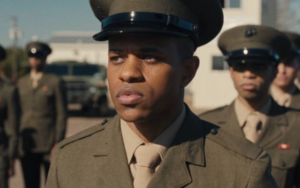NEWSTALK 1010: FISHERMAN’S FRIENDS + ENRICO COLANTONO + ELEGANCE BRATTON
 On this episode of the Richard Crouse Show we get to know, all the way from Cornwall in South West England, Jeremy Brown and Jon Cleave, two of the founding members of the sea shanty singing group Fisherman’s Friends. They have incredible story of being discovered by a music producer who visited their small fishing village of Port Isaac, and propelling them to stardom. Their recordings of traditional sea shanties have topped the charts and they’ve played on the main stage of the Glastonbury Festival in front of 100,000 people and for royalty at the Queen’s Diamond Jubilee. Their story has inspired two films, “Fisherman’s Friends” and the sequel, which is in theatres now, “Fisherman’s Friends: One and All,” starring James Purefoy and now it’s a stage show called “Fisherman’s Friends: The Musical which has just touched diown at the Royal Alexandra Theatre in Toronto after a successful run in the UK.
On this episode of the Richard Crouse Show we get to know, all the way from Cornwall in South West England, Jeremy Brown and Jon Cleave, two of the founding members of the sea shanty singing group Fisherman’s Friends. They have incredible story of being discovered by a music producer who visited their small fishing village of Port Isaac, and propelling them to stardom. Their recordings of traditional sea shanties have topped the charts and they’ve played on the main stage of the Glastonbury Festival in front of 100,000 people and for royalty at the Queen’s Diamond Jubilee. Their story has inspired two films, “Fisherman’s Friends” and the sequel, which is in theatres now, “Fisherman’s Friends: One and All,” starring James Purefoy and now it’s a stage show called “Fisherman’s Friends: The Musical which has just touched diown at the Royal Alexandra Theatre in Toronto after a successful run in the UK.
Then, Enrico Colantoni stops by. You know the talented actor from portraying Elliot DiMauro in the sitcom “Just Shoot Me!,” Keith Mars on the television series “Veronica Mars.” On the big screen he has appeared in the films “Galaxy Quest,” “A.I. Artificial Intelligence,” “Contagion,” and “A Beautiful Day in the Neighborhood.” Today we talk about his latest film, a comedy about four stoners, the self-proclaimed “Vandits”, have a bright idea to knock over a senior citizens bingo hall on Christmas Eve. In this segment we talk about the unusual way he paid for theatre school in New York City and how the cast and crew of “Vandits” persevered after all their equipment was stolen the night before they were to start shooting.
Finally, we’ll meet Elegance Bratton, the film director who turned his story of being a young gay man, who found unexpected strength, camaraderie and support when he joined the Marines, after being rejected by his mother, into a critically acclaimed film called “The Inspection.” It is a classic against-all-odds story that paints a vivid picture of life inside the boot camp, the dehumanization, the violence, but also the brotherhood. The movie carefully builds the world of the boot camp, creating a palette of claustrophobia, brutality and tension that adds layers to the telling of his survival story.
Listen to the whole thing HERE!
Here’s some info on The Richard Crouse Show!
Each week on the nationally syndicated Richard Crouse Show, Canada’s most recognized movie critic brings together some of the most interesting and opinionated people from the movies, television and music to put a fresh spin on news from the world of lifestyle and pop-culture. Tune into this show to hear in-depth interviews with actors and directors, to find out what’s going on behind the scenes of your favourite shows and movies and get a new take on current trends. Recent guests include Chris Pratt, Elvis Costello, Baz Luhrmann, Martin Freeman, David Cronenberg, Mayim Bialik, The Kids in the Hall and many more!
Listen to the show live here:
C-FAX 1070 in Victoria
SAT 5:00 PM to 6:00 PM
SUN 10:00 AM to 11:00 AM
CJAD in Montreal
SAT 8 PM to 9:00 PM
CFRA in Ottawa
SAT 8 PM to 9:00 PM
NEWSTALK 610 CKTB in St. Catharines
Sat 8:00 PM to 9:00 PM
NEWSTALK 1010 in Toronto
SAT 8 PM to 9:00 PM
NEWSTALK 1290 CJBK
SAT 8 PM to 9:00 PM
AM 1150 in Kelowna
SAT 11 PM to Midnight
BNN BLOOMBERG RADIO 1410
SAT 8 PM to 9:00 PM
Click HERE to catch up on shows you might have missed!







